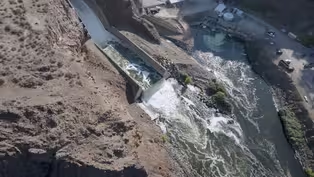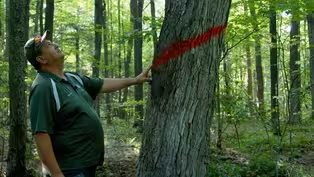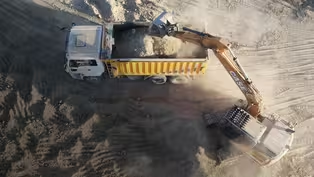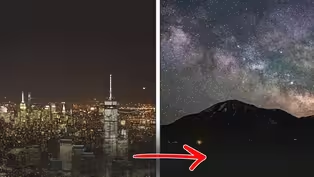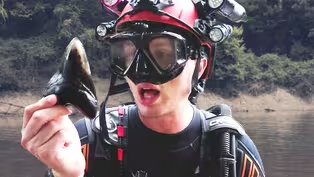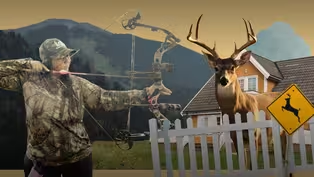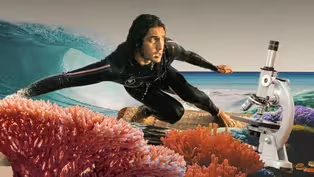
Understory | Climate Change's Effects on Vermont Flooding
Special | 13mVideo has Closed Captions
Discover the science behind this summer’s historic and devasting floods in Vermont.
In Vermont, summer is supposed to be about picnics, wild blueberries and maple creamies. And that’s how it was in 2023, until the floods came. In the hottest July since we started keeping records, the rain didn’t stop for two days, dropping more than nine inches of rain on some cities. And Montpelier, the state capitol, was fighting for its life.
Problems playing video? | Closed Captioning Feedback
Problems playing video? | Closed Captioning Feedback
Major support is provided by Anne Ray Foundation, a Margaret A. Cargill Philanthropy and the Richard King Mellon Foundation. Support is also provided by John and Ruth Huss, Susan and...

Understory | Climate Change's Effects on Vermont Flooding
Special | 13mVideo has Closed Captions
In Vermont, summer is supposed to be about picnics, wild blueberries and maple creamies. And that’s how it was in 2023, until the floods came. In the hottest July since we started keeping records, the rain didn’t stop for two days, dropping more than nine inches of rain on some cities. And Montpelier, the state capitol, was fighting for its life.
Problems playing video? | Closed Captioning Feedback
How to Watch America Outdoors with Baratunde Thurston
America Outdoors with Baratunde Thurston is available to stream on pbs.org and the free PBS App, available on iPhone, Apple TV, Android TV, Android smartphones, Amazon Fire TV, Amazon Fire Tablet, Roku, Samsung Smart TV, and Vizio.
Buy Now
Providing Support for PBS.org
Learn Moreabout PBS online sponsorshipMore from This Collection
How does our country’s diverse landscape shape our experience of the outdoors? That’s the central question behind the new PBS digital series, America Outdoors: Understory. Join host, Baratunde Thurston, as he explores the unexpected places and ways Americans encounter nature, and how their time outside is impacted by climate change, equity, access, outdoor culture and more.
Understory | How Engineered Mosquitos Could Save Birds
Video has Closed Captions
Discover how bacteria could be the key to stopping mosquito-borne illnesses. (11m 37s)
Understory | Can Dam Demolition Save California's Salmon?
Video has Closed Captions
What happens when you remove dams that changed the Klamath River a hundred years ago? (11m 54s)
Understory | Can Ancient Wisdom Save the Forests?
Video has Closed Captions
Forests are in trouble, but could ancient wisdom be the answer to saving our trees? (11m 54s)
Understory | We’re Running Out of Sand
Video has Closed Captions
Sand may seem unremarkable, but the modern world is built on it and we’re running out. (13m 7s)
Understory | The Movement to Save Our Night Skies
Video has Closed Captions
Explore one small town’s mission to save the night sky and help migrating birds. (12m 59s)
Understory | Rock Climbing's Troubled Route Naming Tradition
Video has Closed Captions
Baratunde meets a rock climber who is working to diversify the sport. (8m 48s)
Understory | How the Houseplant Boom Fueled Plant Poaching
Video has Closed Captions
Baratunde meets a plant parent who is bringing awareness to the issue of plant poaching. (7m 31s)
Understory | The Fossil Hunter Uncovering Florida’s Past
Video has Closed Captions
Baratunde meets a Florida fossil hunter and learns how this hobby contributes to science. (9m 11s)
Understory | Meet the Suburban Deer Hunters of Long Island
Video has Closed Captions
Baratunde meets a female suburban bowhunter to discuss how the sport is changing. (8m 35s)
Understory | The Scientist Surfing to Fight Climate Change
Video has Closed Captions
Baratunde meets a surfer scientist in Hawaii who is trying to protect the corals reefs. (10m 6s)
Providing Support for PBS.org
Learn Moreabout PBS online sponsorship- Remember the summer of '23?
(screen rumbling) Phoenix was blistering, at least 110 degrees for 31 days in a row.
(gentle rhythmic music) New York City skies were choked out with orange smoke due to Canadian forest fires, and LA, normally stricken by drought, (thunder crashing) was flooded.
These are all cities we know of, and to be honest, we expect to get hit by extreme climate weather.
They're either too hot or too dry, or located too close to water.
But what about a place like Vermont?
After all, scientists have predicted that this area should be spared from the worst of climate change.
But in 2023, the summer of hell also landed in the Green Mountain State, (water crashing) and suddenly, it feels like nowhere is safe.
(soft rhythmic music) (thunder crashing) (rain splattering) As climate change rattles our country, people have been looking towards climate havens; places with geography that makes them more resilient to the worst effects of the changing climate.
Vermont has consistently appeared on that list, but this summer, that perception was shattered for a lot of Vermonters.
- Huh.
(somber music) Where we're standing right now, kind of the epicenter of flooding activities in Montpelier.
- [Presenter] In only 48 hours, parts of Central Vermont received a shocking nine inches of rain, causing rivers to overflow and inundating some areas with well over three feet of water.
- This was an incredibly powerful event.
Water was rushing through the streets, it washed out roads and ripped through businesses and residents' and state buildings, (cars honking) (alarm beeping) and here in Montpelier, inundated the downtown.
- [Presenter] But as anyone who's endured a flood can tell you, (intense music) raging water is just the beginning.
Pungent, contaminated water stagnated in downtown Montpelier for days.
Two weeks later, the residents are just beginning to understand the scope of the damage.
(hammer banging) - Here we go.
We got it.
So, watch your step.
So you see how you already have mold?
This is all already mold, and this is what happens when porous material gets saturated with water, with bacteria in it.
All of these contents, were under about 10 feet of water, all the way up.
All this has gotta be thrown out.
(somber music) - It's amazing to me what decades of a town look like when you put it all out on the street.
- [Presenter] In the end, residents across the state reported more than 4,000 homes and 800 businesses were damaged.
Around 275 of those buildings were in downtown Montpelier.
- Here we are at Montpelier City Hall.
The downstairs was completely flooded.
Everywhere we look is destruction from the flood.
- At the library, we see seven and a half feet of water, and the books just stuck, completely racked in the basements, and also our electrical, our phones, our internet, all those expensive components were all destroyed.
- This store was kind of my dream.
The daunting part about reopening is finding the capital and the cash to reopen.
The only options for us right now is a small business loan, and a lot of the loan products that they're offering, we're still trying to pay off from when we had to take them out through COVID.
- It's trauma, what we experienced as a community.
We all know each other, we're all friends, and it's just really overwhelming because everyone, their livelihoods, their hopes, their dreams, are just sort of destroyed.
Yeah.
- All the residents and the businesses impacted, you know, are all ultimately gonna have a choice to make as to whether or not to come back.
- [Presenter] But for many business owners, that decision to rebuild is not an easy one.
(church bells ringing) Montpelier was built on a floodplain.
It will flood again.
The question is, how often?
- Last time we had a major flooding disaster like this, they referred to it, of course, as the hundred year storm, (water crashing) and that was only 12 years ago.
So I think it's time we stop calling them a hundred year storms because this is the new normal in a changing climate.
(gentle music) - [Presenter] Tom Rogers is a member of the Stowe Mountain Rescue Team.
They were active in the area during the flooding.
- It's my job to respond to incidences like the flooding we had a couple weeks ago where people need to be rescued, when their lives and safety are in danger.
When I first joined the team 11 years ago, we would average about 30, maybe 40 calls a year.
35 was about average, and now we're usually much more around 60.
Part of that is because we are getting disasters more frequently and more intensely, and I just see that being our future more and more.
It's gonna be very difficult for all of us to do everything we can to keep people safe.
- So what exactly is going on?
How did this safe haven become a disaster zone?
(water trickling) Jon Erickson is a Professor of Sustainability, Science, and Policy.
He says a big factor is Vermont's geography, and where its small towns were founded.
- So in a place like Vermont, the easiest place to build was along the river.
That's where the land was flat.
That's where the land was fertile.
Historically, our rivers meander.
They move from one edge of the river valley to another, and when they're allowed to do that, they can take their water and put them into floodplains.
Flood pains are, in essence, like a big sponge.
They fill with water, (curious music) and then that water slowly seeps underground.
As we've built our cities, we straightened our rivers, we channelized our rivers, and we urbanized our rivers.
We've disconnected them from their floodplains.
When a big storm event comes along, those straight shots become fire hoses.
So when it goes over its bank, it doesn't hit floodplains, it hits pavement, and the water's got no place to go.
- [Presenter] But artificially shaped rivers are only one factor causing Vermont to flood.
(water trickling) The other cause: climate change.
- So it's July, 2023.
We are living, right now, through the hottest month in recorded history.
(intense music) (thunder booming) Warmer air temperatures can hold more water.
More water means more rain.
That intense rainfall needs some place to go.
If you take Montpelier, they got as much rain in a 48 hour period than they usually do in the entire month of July.
Our systems here in Vermont weren't designed for rainstorms of 9, 10, 11 inches in a 48 hour period.
- Of course, Montpelier isn't unique.
Most of the towns and cities we've built around the world aren't designed to withstand these new patterns of extreme weather events.
- No matter who you are, no matter where you live, you can't hide from climate change.
We built the entire human civilization during a very stable climate period.
As we've cranked up the probabilities of bigger, more extreme weather events to occur, (curious music) (waves crashing) our human systems weren't designed for that.
(church bells ringing) - [Presenter] So, what are the solutions?
If there aren't any safe havens, can we at least make our existing cities safer?
- We know that Montpelier is vulnerable to flooding because we've built on the rivers.
I don't think it's realistic to expect that we're gonna take downtown Montpelier and move it somewhere else.
However, there are things we can do to try to make our buildings and our downtown more resilient.
(gentle music) - [Presenter] Places like Montpelier know that devastating floods will happen again, and more often.
- If this happens a couple more times, in a short period of time, there will be no Montpelier.
- [Presenter] So this community has come together for an urgent discussion on how to rebuild.
- We're in an extremely unique position here in Montpelier, right now.
We can make a big difference around the world if we can come up with an idea, which clearly moves people's context of flooding and national emergencies forward.
- [Presenter] And lots of ideas are on the table.
Building roads that can handle flooding, moving utilities out of basements, and relocating key infrastructure away from flood-prone areas.
But one proposal wouldn't happen in the city at all.
It would happen upstream, allowing the waterways access to their historic floodplains.
- So the floodplain is doing its job, it's taking all that extra water and storing it to when the river can handle it again.
This is economic protection.
This is protecting the downstream community from this onslaught of water.
- But those changes, they'll take years to accomplish.
What about the people being affected, right now?
(gentle music) - The front entrance here, it's, you know, the floodline is about here, somewhere.
- [Presenter] Greg Quetel lives in a mobile home community, just outside of Montpelier.
He lost almost everything.
- You know, if this was located somewhere a little higher, I would stay here forever, probably.
You know, after about 20 years, you get attached to a place.
So, it's tough.
- Whenever I'm talking about mobile home park communities, I always like to emphasize how important they are to have as part of our affordable housing landscape.
Unfortunately, while 4% of single family homes in Vermont are in flood prone areas, with mobile homes and parks, it's 12%.
- [Presenter] This is Kelly Hamshaw, a researcher studying mobile home park communities and their resilience to climate change.
Currently, Kelly and her team are helping people who lost their mobile homes, figure out what to do next.
Before the flood, they'd also been working with residents to assess the risk associated with living in a floodplain.
- I feel like no home should be here.
You know, I feel like this is a good time to raise these houses up and do some prevention around here.
- [Presenter] Unfortunately, moving a mobile home can be way too expensive.
So for many people, their homes are mobile in name only.
- You know, when we're thinking about who is living in flood prone areas, we're thinking about folks who may not have the economic means to be able to build back their lives.
- I hope there aren't too many people that fit into that category where they would have to move back in here.
That would be horrible for them, because chances are they'll go through this again in another 10, 15 years.
- One of the things that I've been thinking a lot as we're talking with folks about where they're going to live next, I really come back to we need more affordable housing in areas that are out of harm's way.
(dogs barking) - Vermont's experience reminds us that there's no such thing as a perfect safe haven from the effects of climate change.
We're gonna have to adapt to this new climate reality, protect our most vulnerable, and make sure we're working to solve the bigger issue.
(somber music) - Do I believe in climate change?
It really doesn't matter what the cause is, as far as I care, because it's happening.
I think we have a responsibility, either way, to take a look at what's happening, and if we have anything to do with it, do something about it.
(birds chirping) (water trickling) - Thanks for watching.
Be sure to check out more from Season 2 of "America Outdoors" with Baratunde Thurston.
You can find the show in the PBS app, on your PBS local station, or check the link in the description below.
We've got a link to a full episode and a lot more information about the series.

- Science and Nature

Explore scientific discoveries on television's most acclaimed science documentary series.

- Science and Nature

Capturing the splendor of the natural world, from the African plains to the Antarctic ice.












Support for PBS provided by:
Major support is provided by Anne Ray Foundation, a Margaret A. Cargill Philanthropy and the Richard King Mellon Foundation. Support is also provided by John and Ruth Huss, Susan and...

